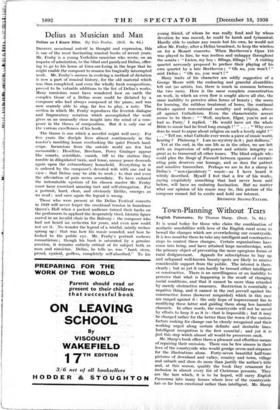Delius as Musician and Man
Delius as I Knew Him. By Erie Fenby. (Bell. 8s. Bd.) DESPITE occasional naivete in thought and expression, this is one of the most fascinating musical books of recent years. Mr. Fenby is a young Yorkshire musician who wrote, on an impulse of admiration, to the blind and paralysed Delius, offer- ing to go to his home at Grez-sur-Loing in the hope that he might enable the composer to resume his tragically interrupted work. Mr. Fenby's success in evolving a method of dictation is now a part of musical history, for the old material which was thus completed, and even the wholly fresh compositions, proved to be valuable additions to the list of Delius's works. Many musicians must have wondered how on earth the complex tissue of a Delius score could be dictated by a composer who had always composed at the piano, and was now scarcely able to sing, far less to play, a note. The section in which Mr. Fenby reproduces the feverish dialogue and fragmentary notation which accomplished the work gives us an unusually close insight into the mind of a com- poser in the throes of composition. But it is only one of the various excellences of his book.
The theme is one which a novelist might well envy. For five years the disciple lives almost continuously in the master's rambling house overlooking the quiet French land- scape. Incursions from the outside world are few but memorable : Heseltine, Beecham, Percy Grainger appear like comets, scintillate, vanish. Off to the station they rumble in dilapidated taxis, and tense, uneasy peace descends again upon the extraordinary household. Everything in it is ordered by the composer's devoted wife with one end in view : that Delius may be able to work ; to that end even the alleviation of pain seems secondary. To have endured the indomitable egotism of his chosen master Mr. Fenby must have exercised amazing tact and self-abnegation. For a portrait, hard, clear, and obviously lifelike, emerges as we read ; and once again the legend is wrong.
Those who were present at the Delius Festival concerts in 1929 will never forget the emotional tension in humdrum Queen's Hall when a packed audience turned their backs on the performers to applaud the desperately tired, hieratic figure seated in an invalid, chair in the Balcony : the composer who had not heard an orchestra for years, and even now could not see it. No wonder the legend of a wistful, saintly recluse sprang up that was how his music sounded, and how he looked to the public eye. Mr. Fenby's portrait eschews romanticism ;. though his book is saturated by a genuine emotion, it remains entirely critical of its subject both as man and Musician. Delius, he tells us, was "hard, stern, proud, cynical, godless, completely self-absorbed." To his young friend, of whom he was really fond and by whose devotion he was moved, he could be harsh and tyrannical. Hardly able to endure any music but his own, he would not allow Mr. Fenby, after a Delius broadcast, to keep the wireless on for a Mozart concerto. When Beethoven's Opus 110 was played to him, he was restless and unhappy throughout the sonata : "Listen, my boy : fillings, fillings I " A visiting quartet nervously proposed to preface their playing of his own quartet by a late Beethoven ; " Oh no, you won't ! " said Delius ; "Oh no, you won't ! "
Many traits of his character are oddly suggestive of a George Moore with the endearing and graceful absurdities left out (as artists, too, there is much in common between the two men). Here is the same complete concentration on work, in which an even flow is sought above all else, the same inability to perceive alien forms of beauty ; the scorn for learning, the ruthless treatment of bores, the continual tirades against conventional morality and religion, above all against Catholicism. Even the characteristic accent seems to be there : "'Well, anyhow, Elgar, you're not as bad as Parry,' I replied. 'He would have set the whole Bible to music had he lived long enbugh ! ' " . . "Why ever does he want to argue about religion on such a lovely night ? " ... "Tell me, what Catholic ever wrote a piece of music worth hearing ? Plainsong ? I see no mystery in it ; just dullness."
Yet at the end, in the one life as in the other, we are left with an impression of will-power and artistic integrity so great as to transcend all other issues. The blind cripple who could plan the Songs' of Farewell between spasms of excruci- ating pain deserves our homage, and so does the patient and sensitive transcriber. Perhaps we are in for a slump in Delius's " non-ejaculatory " music—as I have heard it wittily described. Myself I feel that a few of his works, saying exquisitely something that had never been said before, will have an enduring fascination. But no matter what our opinion of his• music may be, this picture of the composer cannot fail to excite and hold our interest.
DESMOND SHAWE-TAYLOR.










































 Previous page
Previous page